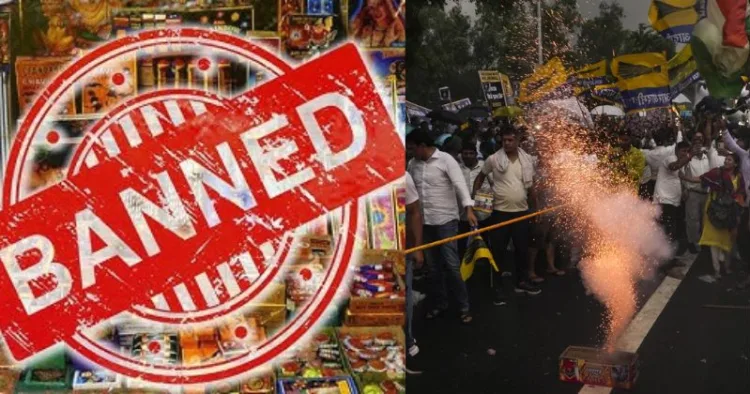NEW DELHI: The double standards adopted by Delhi’s AAP government stand exposed and reveals their anti-Hindu stand. A few days ago, Delhi’s AAP government announced a complete ban on the production, sale, and use of firecrackers in the national capital ahead of the winter season. This decision was part of the government’s ongoing efforts to curb the severe air pollution that blankets the city every year during the winter months. The ban is set to remain in effect until January 1, 2025, and includes not only physical sales but also the online distribution of fireworks.
Environment Minister Gopal Rai had made the announcement, stressing that the government would develop a strict action plan to ensure the ban’s enforcement. This plan will be crafted in consultation with the Delhi Police, the Delhi Pollution Control Committee, and the Revenue Department to make sure that the restrictions are upheld and violators are penalized accordingly.
On the other side, workers belonging to the Aam Aadmi Party were seen bursting firecrackers outside Arvind Kejriwal’s residence after the Supreme Court granted him bail in the Delhi liquor scam case. The incident raised questions about the consistency and seriousness of the government’s policies, as they violated the very ban that was supposed to fight air pollution. Critics argue that such actions undermine the credibility of the government’s anti-pollution campaign.
This is not the first time that the AAP has been accused of taking actions perceived as anti-Hindu. The party has often faced criticism for targeting Hindu traditions and festivals. One of the most controversial figures in the party, Rajendra Pal Gautam, has been involved in several instances where he has made anti-Hindu remarks. Gautam has been accused of attempting to divide communities by encouraging mass conversions of Hindus and making statements that malign Hindu beliefs. His actions have sparked outrage, and many view them as part of AAP’s broader anti-Hindu agenda. These incidents have fueled suspicions about the party’s ideological stance, with critics arguing that AAP selectively targets Hindu practices while overlooking others.
In the larger context of Delhi’s air pollution crisis, the firecracker ban has become a recurring measure during Deepawali, an important Hindu festival. For years, the AAP government had enforced these bans, placing the blame for the city’s hazardous air quality on Deepawali fireworks. The major source of Delhi’s poor air quality during the winter months is stubble burning from neighboring states, primarily Punjab, which is also governed by AAP, which has been a key contributor to this issue.
Despite this, the Delhi government has been accused of turning a blind eye to stubble burning in AAP-ruled Punjab. Critics argue that the government selectively focuses on Deepawali, a Hindu festival, as the main culprit for pollution while failing to adequately address the larger and more persistent problem of crop residue burning. This selective enforcement has been seen by many as an attempt to scapegoat Hindu traditions, further deepening the perception that AAP harbors an anti-Hindu bias.
Union Minister and BJP leader Harsh Malhotra has been vocal in criticising the Delhi government’s handling of pollution, particularly the state of the Yamuna River. He accused the AAP of making false promises about cleaning the river, which remains heavily polluted despite years of assurances. Malhotra emphasised that pollution in the Yamuna poses serious health risks to residents living nearby, and the government’s failure to act has compounded the problem.
As the winter months approach and air quality continues to worsen, the impact of pollution on public health is becoming increasingly severe. A recent survey revealed that 36 per cent of families in Delhi-NCR have at least one member suffering from pollution-related health issues, including sore throats, coughs, and breathing difficulties. Another 27 per cent of families reported symptoms such as runny noses and congestion.
While the AAP government’s ban on firecrackers is part of a larger effort to combat air pollution in Delhi, it has drawn criticism for both its inconsistency in enforcement and its perceived bias against Hindu festivals. With the issue of stubble burning largely unaddressed and the Yamuna River’s pollution unchecked, the government’s approach to pollution control remains under scrutiny




















Comments